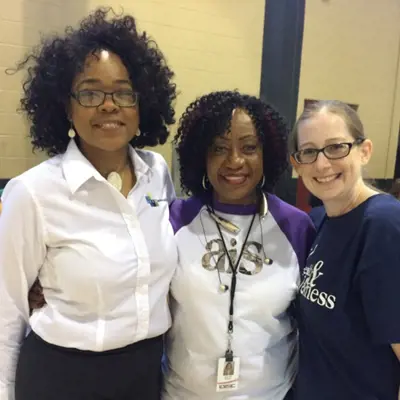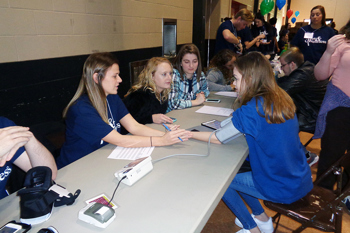
Students develop professionalism and organizing experience for wellness fair
June 15, 2017
Faculty from four disciplines, 118 USI students and an array of community vendors planned and put on a wellness fair for 400 students at the Academy of Innovative Studies (AIS) on the First Avenue campus this past spring. It was the second annual fair and served as a service learning project in six USI classes.
The Academy for Innovative Studies is a non-traditional learning environment for students in grades 9 - 12 who struggles with attendance and discipline issues, as well as socioeconomic ones. The age range for these students is 15 to 22. The average four-year graduation rate is 20 percent and another 20 percent are pregnant or are already parents.
Dr. Erin Reynolds, assistant professor of health services/administration, connected with Kerseclia Patterson, SWI-AHEC academic outreach coordinator, who suggested AIS as a location for the fair. Patterson had prior contact with Bettye Poole, family engagement coordinator at AIS and knew she wanted a health fair. Reynolds enrolled the help of several USI faculty members including Dr. Ethel Elkins, Dr. Phoneshia Wells, Dr. Gabriela Mustata Wilson, Julie St. Clair and Dr. Swateja Nimkar. The health services faculty received a Major as Home grant to purchase supplies and door prizes.
 In Reynold's Community Health Education Methods class, students took the reins planning the event and inviting vendors. Additionally, students designed flyers, arranged room layout for vendors, prepared surveys and informational brochures. "Students wanted more responsibilities," said Reynolds. "They wanted the success or failure to depend on them and not rely on us to be a safety net."
In Reynold's Community Health Education Methods class, students took the reins planning the event and inviting vendors. Additionally, students designed flyers, arranged room layout for vendors, prepared surveys and informational brochures. "Students wanted more responsibilities," said Reynolds. "They wanted the success or failure to depend on them and not rely on us to be a safety net."
In Elkins' Professionalism in Health Care class, the focus was grooming students for a professional setting and to pass this knowledge over to students at AIS. Along with information about nutrition and proper exercise, AIS students were taught how to give a proper business handshake and fill out resumes. They also learned other life skills such as getting a library card or opening a bank account from community vendors at the fair.
Reynolds and Elkins are brainstorming ways to deepen their students' professional acumen and simulate the health care career dynamic for the next wellness fair. One idea they're developing is the creation of joint student committees. Rather than division of groups by class, students would select the components of the fair they want to work on. Students across different would choose from various committee, such as fundraising, marketing, organizing vendors, etc.
Elkins said the experience challenged her students. "It exposed them to a population they'll have contact with as health professions and helps them to develop empathy for those with socioeconomic challenges." Students have responded positively to the opportunity. One said, "It made me more closely examine and recognize needs in the community. It also reminded me that "wellness" is more than physical health, it also involves meeting financial, mental and emotional needs.